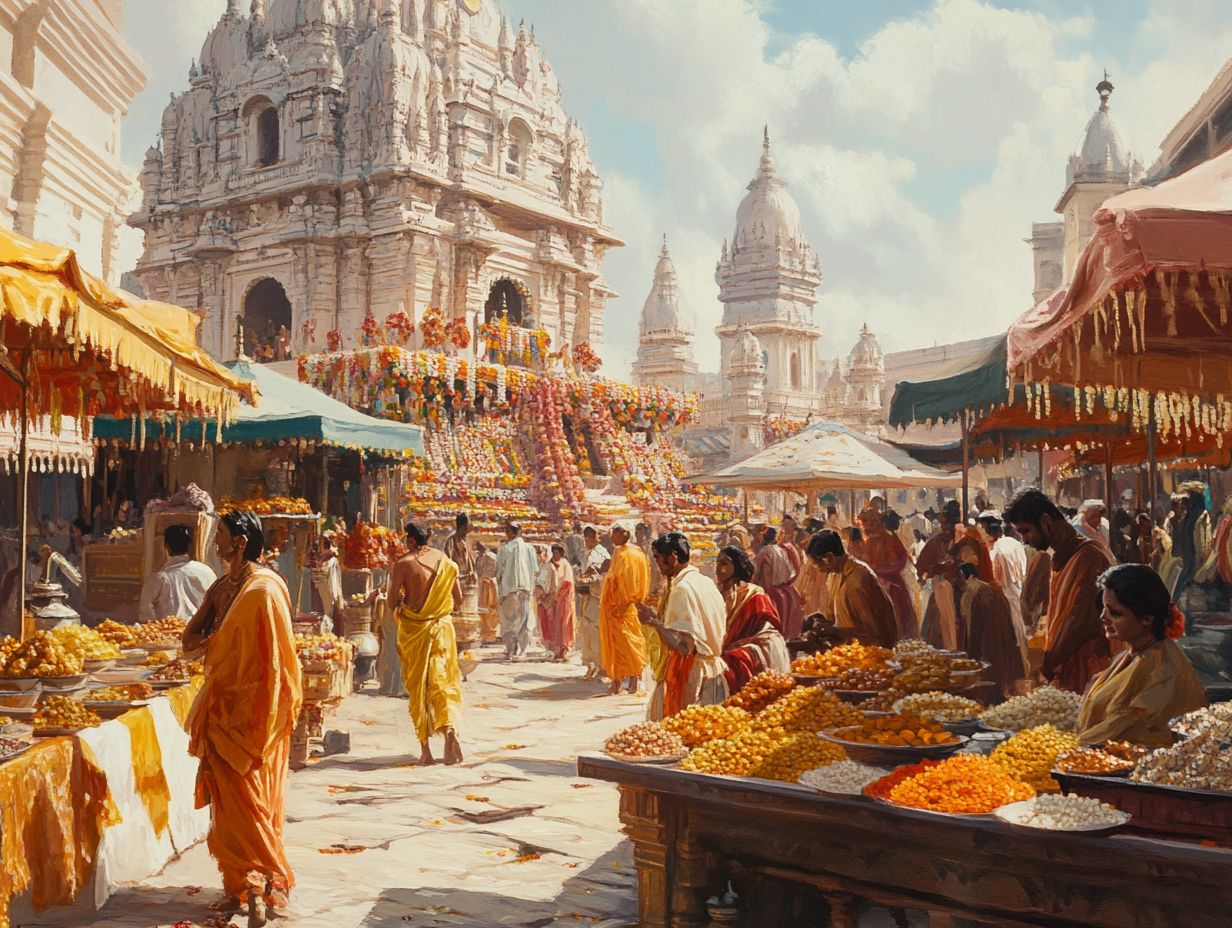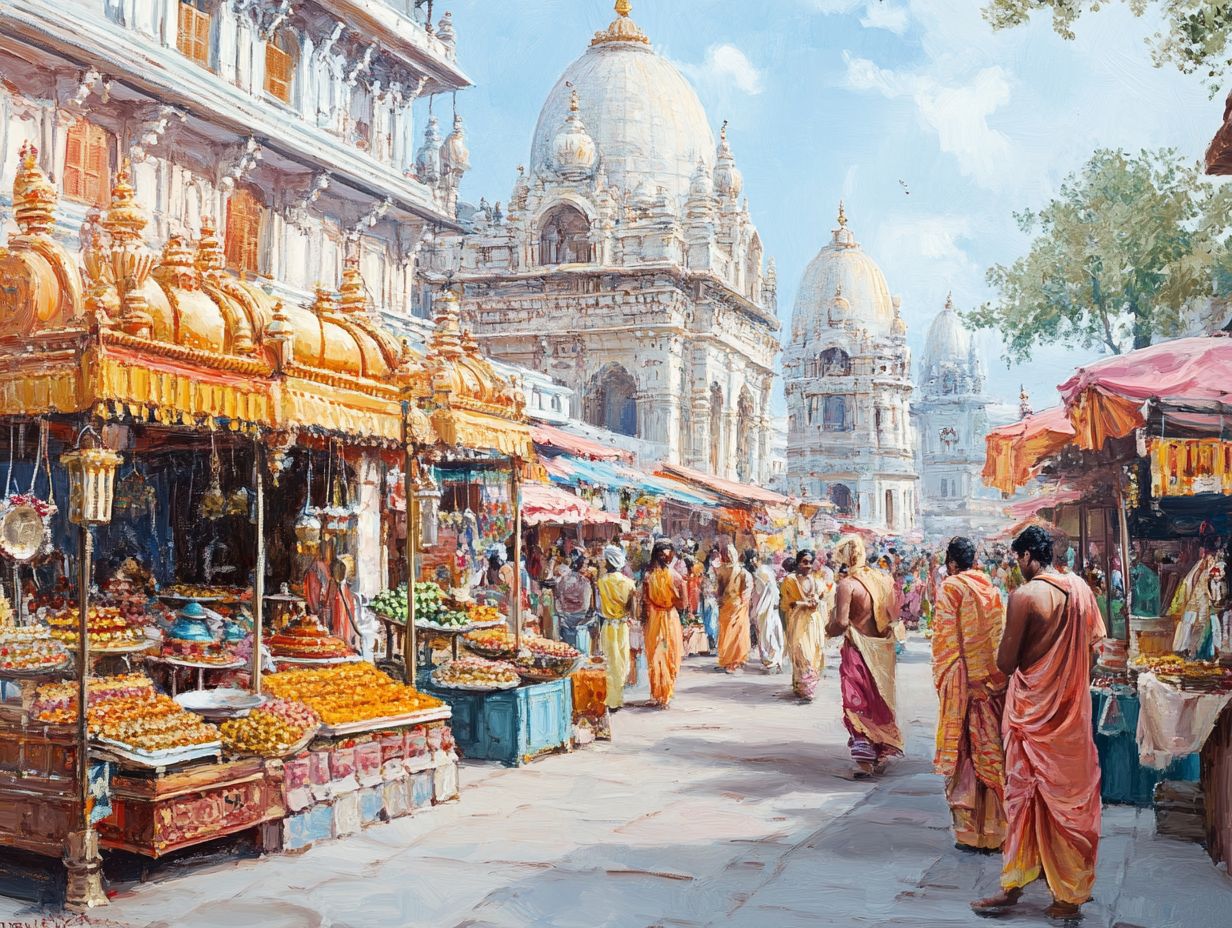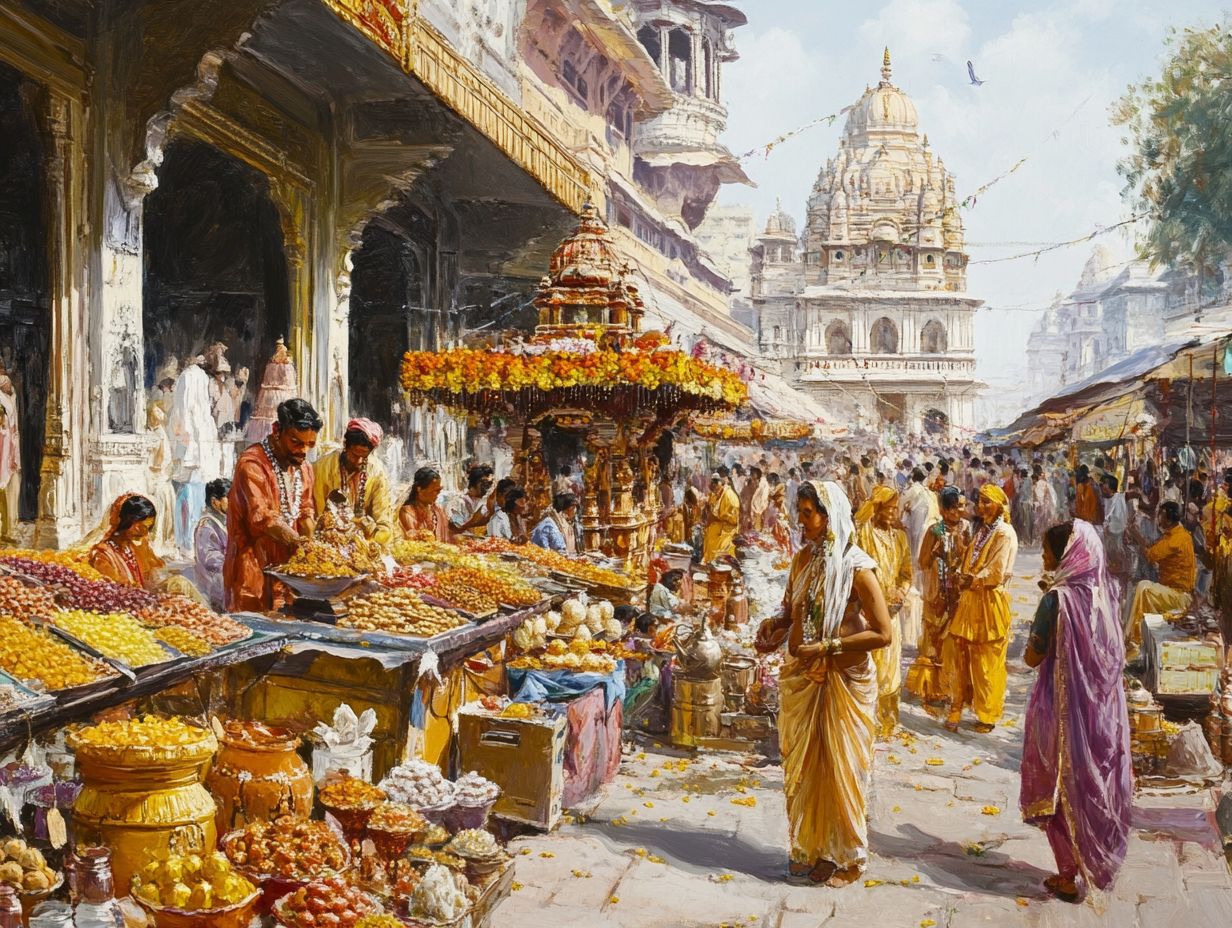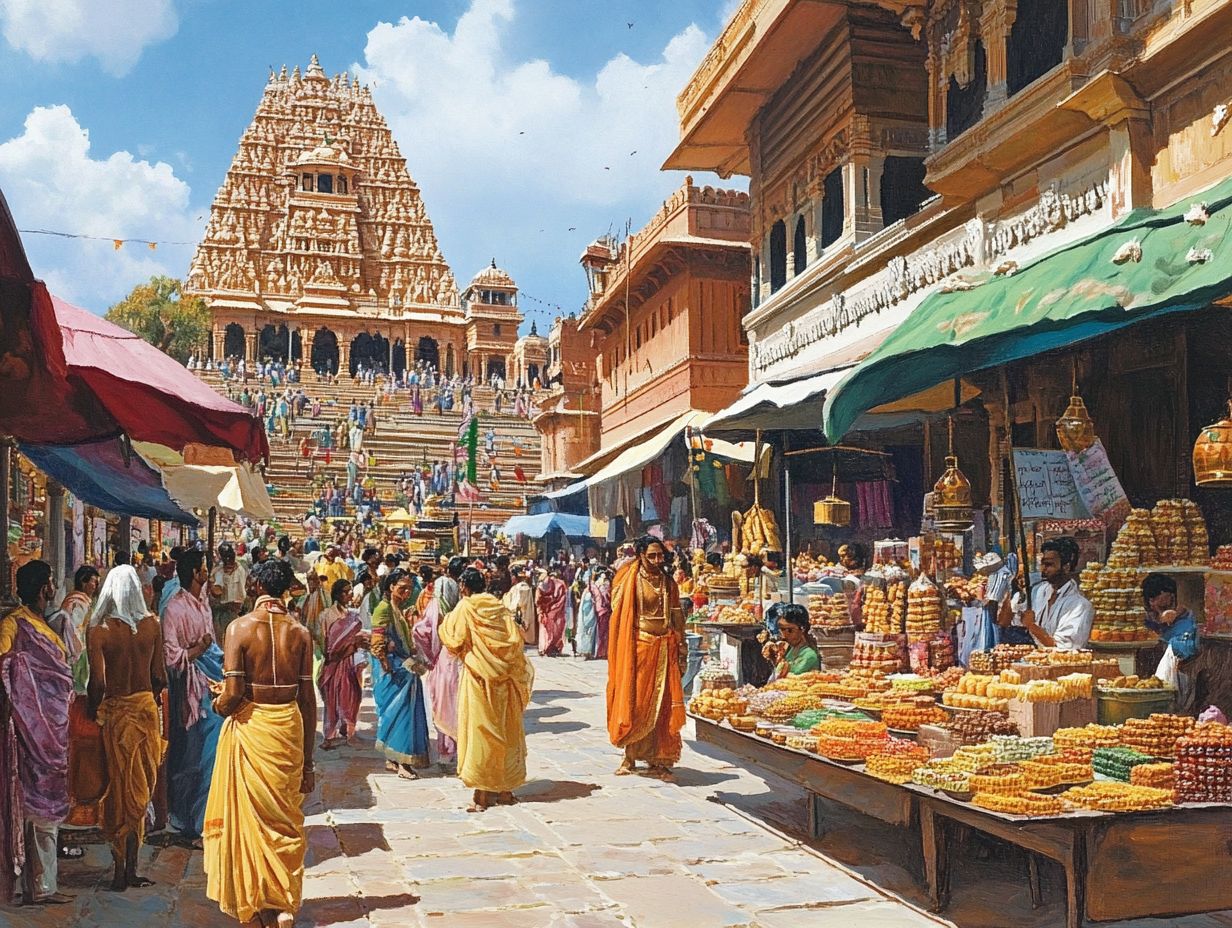Why is Mathura Important to Hinduism?
Mathura, a city rich in mythology and spiritual significance, occupies a revered position in Hinduism as the birthplace of Lord Krishna. Its historical and religious importance is intricately woven into the very fabric of Hindu culture, establishing it as a pivotal pilgrimage destination. Located in Uttar Pradesh, it is closely associated with Vrindavan, another sacred place integral to Krishna’s life.
This city boasts deep mythological roots and plays a central role in sacred texts, adorned with an array of temples and festivals that commemorate Krishna’s life. One can explore how this ancient city continues to shape Hindu traditions and exert a profound influence on devotees across the globe.
History of Mathura in Hinduism

Mathura, esteemed as the birthplace of Lord Krishna, occupies a central position in Hinduism, embodying a rich tapestry of ancient history and spirituality that permeates its sacred landscapes.
The historical significance of Mathura is profoundly intertwined with Hindu mythology, serving as the backdrop for numerous events chronicled in revered texts such as the Bhagavad Gita and the Bhagavata Purana. The cultural practices and traditions observed here resonate deeply with the teachings found within these religious texts.
As a cornerstone of Krishna consciousness, Mathura draws millions of devotees and tourists alike, all eager to immerse themselves in its temples, vibrant festivals, and the divine narratives that have sculpted Hindu beliefs over the centuries.
This Holy Land not only plays a critical role in religious practices but also stands as a testament to the enduring faith of its followers, reflecting the deep-rooted spirituality that continues to thrive within its boundaries. The divine connection between Mathura and Krishna makes it an essential part of Hindu beliefs and rituals.
What is the Mythological Significance of Mathura?
Mathura’s mythological significance is deeply intertwined with Lord Krishna, whose divine essence permeates the city’s landscapes and narratives, establishing it as a pivotal center of Hindu mythology and devotion.
The captivating tales of his childhood, often illustrated through vibrant accounts of mischief and miraculous deeds, have woven themselves into the hearts of countless devotees. These remarkable stories encapsulate the spirit of his playful nature, as he captivated the people of Mathura with his charming escapades.
The sacred rituals associated with his worship reveal a rich cultural heritage, with festivals like Janmashtami echoing the rhythms of devotion, celebrating the divine love and joy embodied by Krishna.
Throughout every corner of Mathura, the legacy of his adventures serves to inspire and unite spiritual seekers, honoring the timeless connection between the divine and the human experience. This connection is further enriched by the Bhakti movement, which emphasizes love and devotion to Krishna.
How Did Mathura Become an Important Place for Hinduism?
Mathura’s rise as a pivotal hub for Hinduism can be traced to its profound religious significance, heightened by its connection to Krishna consciousness and the multitude of pilgrimage routes that converge on its sacred sites.
The city s rich historical tapestry is interwoven with numerous temples and monuments dedicated to Lord Krishna, each one recounting tales from ancient scriptures that enrich its spiritual allure. Mathura is not merely the birthplace of Krishna; it stands as a vibrant epicenter of cultural practices, where age-old traditions seamlessly blend with a steadfast faith.
Pilgrims journey from distant lands, partaking in time-honored rituals and festivals that breathe life into the spiritual atmosphere. These traditions, including community worship and sacred rituals, reinforce the cultural identity and unity among the devotees.
This unwavering devotion resonates throughout the city streets, vividly illustrating the deep intertwining of community life and religion. In this way, Mathura firmly establishes itself as a cornerstone of Hindu faith, worship, and cultural identity.
Religious Importance of Mathura
The religious significance of Mathura is elegantly exemplified through its myriad temples, vibrant festivals, and the sacred practices that draw countless devotees in search of a deeper connection with the divine.
What Are the Major Hindu Temples in Mathura?
Mathura boasts an impressive array of major Hindu temples, each distinguished by its unique architecture and serving as revered sites of worship, reflecting the city’s profound spiritual heritage.
Among these, the Krishna Janmabhoomi Temple commands attention as the birthplace of Lord Krishna. It showcases a harmonious blend of modern and traditional architectural elements, attracting visitors for its daily rituals and vibrant festivals.
The Dwarkadhish Temple adds to this spiritual landscape with its intricate carvings and marble fa ade, epitomizing exquisite artistry while facilitating communal worship practices that nurture a deep connection with the divine.
Another significant site is the Vishram Ghat, where pilgrims gather for sacred baths, enveloped by shrines dedicated to various deities. Together, these temples not only exemplify the diverse styles of Hindu architecture but also emphasize Mathura’s pivotal role in India’s spiritual geography.
Each structure contributes to the rich mythological tapestry that enhances the faith of countless devotees. The unique architecture of these temples not only reflects ancient art and history but also the spiritual geography of India.
What are the Festivals Celebrated in Mathura?

Mathura vibrantly embraces a multitude of festivals, with Janmashtami emerging as a premier highlight that encapsulates the city’s rich cultural heritage and deep religious devotion to Lord Krishna. This festival, which commemorates Krishna’s birth, draws thousands of devotees who partake in elaborate ceremonies, captivating devotional singing, and spirited dance performances.
During this time, the entire city metamorphoses into a dazzling kaleidoscope of colors, as both locals and visitors congregate to revel in the festive atmosphere, adorned with twinkling lights and intricate decorations.
Beyond Janmashtami, Mathura pulsates with joy during Holi, when residents enthusiastically engage in celebrations involving vibrant colored powders, symbolizing the arrival of spring and the eternal triumph of good over evil.
Diwali, too, holds a cherished place in the hearts of the community, with nights illuminated by the gentle glow of diyas and filled with the enticing aroma of traditional sweets, reinforcing cultural identity and strengthening communal bonds.
Significance of Mathura in Hindu Scriptures
The significance of Mathura in Hindu scriptures is profound, frequently highlighted in esteemed texts such as the Bhagavad Gita and the Bhagavata Purana.
Its centrality underscores its vital role in the teachings and mythological narratives that profoundly influence Hindu thought and culture.
What Do Hindu Scriptures Say About Mathura?
Hindu scriptures eloquently convey Mathura’s significance through profound teachings centered on Krishna, presenting a harmonious blend of philosophy and spirituality that deeply resonates with believers. These teachings often highlight the importance of bhakti, or devotional worship, as a path to divine connection.
The narratives surrounding this sacred city not only illuminate Krishna’s life and teachings but also embody universal themes of love, devotion, and divine play (Lila) that effortlessly captivate followers. Verses from revered texts such as the Bhagavata Purana underscore Mathura’s importance as a birthplace, where the essence of dharma is encapsulated in the unique relationship between the divine and the devotee.
Discussions regarding the spiritual practices and festivals celebrated in Mathura further enrich the understanding of bhakti, demonstrating how the city serves as a vibrant hub for cultivating devotion. Here, pilgrims discover a profound connection to the divine, deepened by their transformative experiences.
How is Mathura Connected to Lord Krishna?
Mathura’s connection to Lord Krishna is pivotal, celebrated as his birthplace, where divine love first manifested and continues to inspire countless spiritual journeys. This sacred city embodies the essence of love and devotion core themes that define Krishna’s life.
As one strolls through the vibrant streets of Mathura, the echoes of significant events resonate, bringing to life his childhood adventures and the enchanting Rasleela. The tales of his triumph over formidable foes like Kansa instill a profound sense of resilience and faith, inviting devotees to draw parallels with their own experiences.
Contemporary spiritual practices are deeply influenced by these narratives, as individuals strive to embody the virtues exemplified by Krishna compassion, joy, and unwavering devotion. Consequently, Mathura transcends its status as merely a historical landmark; it stands as a living testament to a timeless spiritual legacy.
Pilgrimage to Mathura
The pilgrimage to Mathura stands as a profoundly enriching experience, inviting devotees to partake in meaningful rituals and customs that elevate their spiritual journey in the sacred realm of Krishna. The rituals of Mathura, including meditation and traditional practices, deepen one’s spiritual connection.
How to Plan a Pilgrimage to Mathura?

Planning a pilgrimage to Mathura necessitates meticulous attention to sacred sites, travel logistics, and optimal timing for engaging in significant festivals and rituals.
This ancient city, celebrated as the birthplace of Lord Krishna, presents a wealth of spiritual experiences and houses numerous venerated temples. To ensure a rewarding journey, one should begin by identifying key landmarks such as the Krishna Janmabhoomi temple, Dwarkadhish temple, and Vishram Ghat.
Navigating the area may require reliance on local transportation options, including rickshaws and buses. Coordinating the visit with major festivals like Janmashtami or Holi can significantly enhance the spiritual atmosphere and provide exceptional opportunities to immerse oneself in lively celebrations and rituals, which are deeply rooted in Hinduism and Krishna worship.
A thoughtfully organized pilgrimage not only deepens the spiritual experience but also unveils the rich cultural tapestry of Mathura, revered as the birthplace of Lord Krishna and a site of immense spiritual significance.
What Are the Rituals and Customs Followed During a Pilgrimage to Mathura?
During a pilgrimage to Mathura, various rituals and customs unfold, reflecting the rich tapestry of devotion and worship that defines this sacred journey. Devotees immerse themselves in profound practices, chanting sacred hymns, participating in community prayers, and making ritualistic offerings at the numerous temples dedicated to Lord Krishna, known for their historical and religious significance.
Many pilgrims commence their day with an early morning bath in the holy Yamuna River, believed to purify the soul and prepare them for spiritual endeavors. The atmosphere resonates with the sounds of conch shells and is infused with the fragrance of flowers, cultivating a deep sense of communal engagement. Followers converge to share stories of divine encounters, strengthening their bonds and enriching their faith as they traverse paths steeped in centuries of devotion and explore Vrindavan, another sacred place closely associated with Krishna’s life.
Mathura’s Influence on Hindu Culture, Art, and Society
Mathura exerts a profound influence on Hindu culture and society, enriching artistic expressions, elevating festival celebrations, and fostering the communal gatherings that are central to its vibrant cultural identity.
This historic city serves as a crucible for traditions that shape the spiritual and social fabric of the community, leaving an indelible mark on the cultural landscape. It is not only a pilgrimage site but also a center for meditation and community worship, reflecting its deep-rooted spirituality and cultural heritage.
How Has Mathura Shaped Hindu Art and Architecture?
Mathura has been instrumental in shaping Hindu art and architecture, with its temples and sculptures featuring intricate designs that vividly narrate the tales of deities and the fervor of devotion. This city, revered as the birthplace of Lord Krishna, has long served as a dynamic hub for artistic expression through the ages.
The temples, including the illustrious Vishram Ghat and Dwarkadheesh Temple, exemplify a distinctive fusion of architectural styles, seamlessly integrating influences from the ancient Gupta period with later medieval traditions. Other notable sites include the Keshava Deo Temple, which adds to the city’s rich architectural tapestry.
The exquisite sculptures, particularly those illustrating moments from Krishna’s life, stand out not only for their exceptional craftsmanship but also for the profound spiritual narratives they convey. These artworks are often mentioned in ancient Puranas and other religious texts, highlighting their cultural and historical significance.
Visitors to Mathura often find themselves captivated by the striking marble and sandalwood figures that embellish numerous structures, chronicling significant events from Hindu mythology and showcasing a rich, enduring cultural heritage.
What Are the Traditions and Practices Unique to Mathura?
The traditions and practices unique to Mathura are a tapestry of vibrant festivals, local cuisine, and community-centric rituals that beautifully embody the essence of Krishna consciousness and communal harmony. The Bhakti movement has also left a lasting impact on the spiritual and cultural fabric of the city.
In this sacred city, celebrations such as the exuberant festival of Holi attract throngs of people from both near and far. Here, the playful exchange of colored powders and water symbolizes not only the arrival of spring but also the triumph of good over evil. Visitors to Mathura have the opportunity to savor traditional delicacies like ‘peda’ and ‘jalebi’, culinary staples that are integral to the region’s identity and often enjoyed during communal gatherings.
Community events, rich with devotional singing and lively dancing, serve to strengthen social bonds and foster a collective expression of joy. These cultural experiences transcend mere religious significance, showcasing the deep-rooted values of respect, love, and togetherness that define life in Mathura. The teachings of Krishna, as documented in sacred texts like the Gita, inspire many of these traditions and practices.
Frequently Asked Questions

Why is Mathura Important to Hinduism?
Mathura is a holy city located in the northern Indian state of Uttar Pradesh and is considered to be the birthplace of Lord Krishna, one of the most important deities in Hinduism. This sacred city holds great significance in Hinduism for various reasons, including its rich history and vibrant cultural heritage.
What is the significance of Mathura in Hindu mythology?
In Hindu mythology, Mathura is believed to be the place where Lord Krishna was born in the Dwapara Yuga. It is also said to be the place where Lord Krishna spent his childhood and performed many miraculous deeds, known as Krishna Leela.
Why is Mathura known as the ‘City of Temples’?
Mathura is known as the ‘City of Temples’ because it is home to numerous ancient and sacred temples dedicated to different gods and goddesses. These temples attract millions of Hindu pilgrims every year, contributing to the city’s religious tourism and showcasing its rich cultural diversity.
How does Mathura play a role in Hindu religious festivals?
Mathura is the site of many important Hindu festivals such as Janmashtami, which celebrates the birth of Lord Krishna, and Holi, the festival of colors. These festivals in Mathura hold great significance for Hindus and are celebrated with grandeur in Mathura, reflecting its rich religious traditions and cultural practices.
What is the importance of Mathura in Hinduism today?
Even in modern times, Mathura continues to hold a special place in the hearts of Hindus. It is considered a sacred pilgrimage site and attracts devotees from all over the world who come to seek blessings and spiritual enlightenment. The city’s influence extends to various aspects of Hindu philosophy and nationalism, making it a focal point for both religious and cultural significance.
How has Mathura influenced Hindu art and culture?
Mathura has a rich heritage of art and culture, with many ancient sculptures and paintings depicting scenes from Hindu mythology. It has also been a center for the development of various dance forms and music traditions, making it an important cultural hub in Hinduism. The mythology of Krishna is often a central theme in these artistic expressions, enhancing the city’s spirituality and cultural richness.
